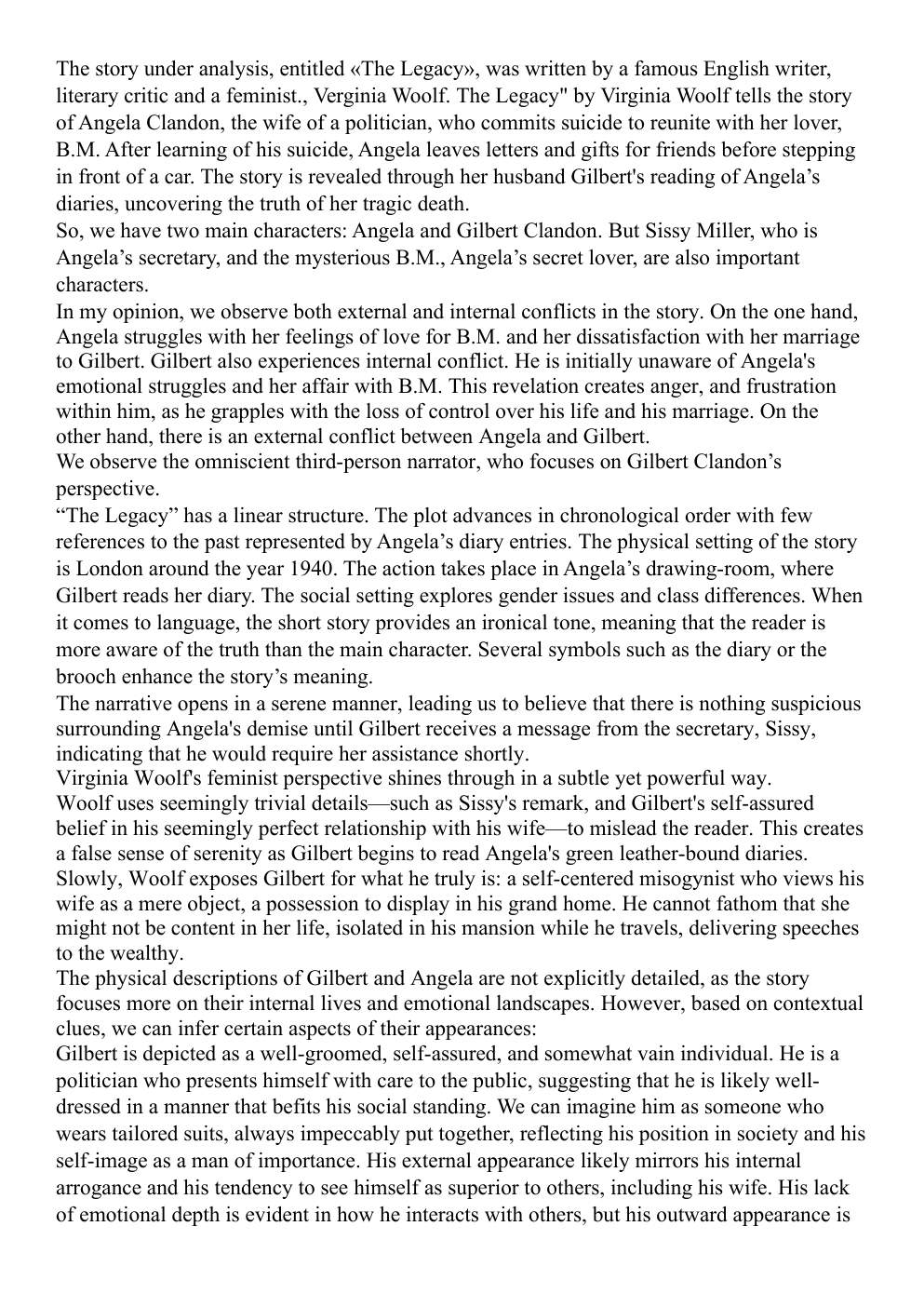Тема материнской любви в романе «Обещание на рассвете» Ромена Гари
Publié le 26/01/2025
Extrait du document
«
The story under analysis, entitled «The Legacy», was written by a famous English writer,
literary critic and a feminist., Verginia Woolf.
The Legacy" by Virginia Woolf tells the story
of Angela Clandon, the wife of a politician, who commits suicide to reunite with her lover,
B.M.
After learning of his suicide, Angela leaves letters and gifts for friends before stepping
in front of a car.
The story is revealed through her husband Gilbert's reading of Angela’s
diaries, uncovering the truth of her tragic death.
So, we have two main characters: Angela and Gilbert Clandon.
But Sissy Miller, who is
Angela’s secretary, and the mysterious B.M., Angela’s secret lover, are also important
characters.
In my opinion, we observe both external and internal conflicts in the story.
On the one hand,
Angela struggles with her feelings of love for B.M.
and her dissatisfaction with her marriage
to Gilbert.
Gilbert also experiences internal conflict.
He is initially unaware of Angela's
emotional struggles and her affair with B.M.
This revelation creates anger, and frustration
within him, as he grapples with the loss of control over his life and his marriage.
On the
other hand, there is an external conflict between Angela and Gilbert.
We observe the omniscient third-person narrator, who focuses on Gilbert Clandon’s
perspective.
“The Legacy” has a linear structure.
The plot advances in chronological order with few
references to the past represented by Angela’s diary entries.
The physical setting of the story
is London around the year 1940.
The action takes place in Angela’s drawing-room, where
Gilbert reads her diary.
The social setting explores gender issues and class differences.
When
it comes to language, the short story provides an ironical tone, meaning that the reader is
more aware of the truth than the main character.
Several symbols such as the diary or the
brooch enhance the story’s meaning.
The narrative opens in a serene manner, leading us to believe that there is nothing suspicious
surrounding Angela's demise until Gilbert receives a message from the secretary, Sissy,
indicating that he would require her assistance shortly.
Virginia Woolf's feminist perspective shines through in a subtle yet powerful way.
Woolf uses seemingly trivial details—such as Sissy's remark, and Gilbert's self-assured
belief in his seemingly perfect relationship with his wife—to mislead the reader.
This creates
a false sense of serenity as Gilbert begins to read Angela's green leather-bound diaries.
Slowly, Woolf exposes Gilbert for what he truly is: a self-centered misogynist who views his
wife as a mere object, a possession to display in his grand home.
He cannot fathom that she
might not be content in her life, isolated in his mansion while he travels, delivering speeches
to the wealthy.
The physical descriptions of Gilbert and Angela are not explicitly detailed, as the story
focuses more on their internal lives and emotional landscapes.
However, based on contextual
clues, we can infer certain aspects of their appearances:
Gilbert is depicted as a well-groomed, self-assured, and somewhat vain individual.
He is a
politician who presents himself with care to the public, suggesting that he is likely welldressed in a manner that befits his social standing.
We can imagine him as someone who
wears tailored suits, always impeccably put together, reflecting his position in society and his
self-image as a man of importance.
His external appearance likely mirrors his internal
arrogance and his tendency to see himself as superior to others, including his wife.
His lack
of emotional depth is evident in how he interacts with others, but his outward appearance is
polished, signifying his role as a public figure.
When Sissy suggests that he will need her to
explain certain matters, he egoistically assumes that she may have romantic feelings for him.
When it comes to his marriage, Gilbert appears to appreciate his wife’s beauty and treats her
as a symbol of his success.
For example, Gilbert mentions that he often compared Angela to
other women, concluding that she was the “loveliest”, which made him feel proud to be her
husband.
Gilbert was a misogynist.
The text reveals his disdain for the way Angela dressed
while doing her charity work in the East End, contrasting sharply with his own immaculately
polished appearance.
Gilbert’s world was one of speeches to the elite, and he was blind to the
glaring faults in his personal life.
He never truly respected Angela, and, tragically, he never
loved her either.
Angela is described through her actions, emotions, and the way she is perceived by others,
rather than through direct physical description.
However, there are some insights into her
appearance.
We know that Angela is a woman who tries to maintain a dignified and
understated presence, but Gilbert's judgment reveals her more simple, perhaps more practical
way of dressing, particularly when she is involved in her charitable work in the East End.
Gilbert disapproves of the simple way she dresses for this work, suggesting that Angela's
clothes are modest and less concerned with status or appearance.
Angela's emotional journey
of self-discovery and rebellion might also be reflected in subtle ways in her demeanor or
appearance, as she moves from being the "dutiful wife" to a woman who takes charge of her
own destiny.
Angela evolves from a submissive wife to a more independent and self-aware woman.
Initially, she is content in her marriage, but as she becomes involved in charity work, she
begins to develop her own sense of purpose and identity.
Her relationship with B.M.
challenges her emotional and intellectual boundaries, leading her to question her life with
Gilbert.
By the end, Angela makes the ultimate decision to escape her unfulfilling marriage,
symbolizing her transformation from....
»
↓↓↓ APERÇU DU DOCUMENT ↓↓↓

































